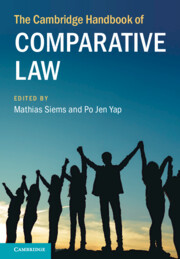Book contents
- The Cambridge Handbook of Comparative Law
- The Cambridge Handbook of Comparative Law
- Copyright page
- Contents
- Figures
- Tables
- Contributors
- Preface
- Abbreviations
- 1 Introduction
- Part I Methods of Comparative Law
- Part II Legal Families and Geographical Comparisons
- Part III Central Themes in Comparative Law
- 19 The Tradition of Comparative Law: Comparison and Its Colonial Legacies
- 20 Decolonial Theory and Comparative Law
- 21 Legal Transplants: A Theoretical Framework and a Case Study from Public Law
- 22 Legal Transplants: A Case Study of Private Law in Its Historical Context
- 23 Convergence and Divergence in Public Law
- 24 Convergence and Divergence in Company Law
- 25 Law and Development
- 26 Divided Legal Systems
- 27 Legal Pluralism and Commerce
- Part IV Comparative Law beyond the State
- Index
21 - Legal Transplants: A Theoretical Framework and a Case Study from Public Law
from Part III - Central Themes in Comparative Law
Published online by Cambridge University Press: 26 January 2024
- The Cambridge Handbook of Comparative Law
- The Cambridge Handbook of Comparative Law
- Copyright page
- Contents
- Figures
- Tables
- Contributors
- Preface
- Abbreviations
- 1 Introduction
- Part I Methods of Comparative Law
- Part II Legal Families and Geographical Comparisons
- Part III Central Themes in Comparative Law
- 19 The Tradition of Comparative Law: Comparison and Its Colonial Legacies
- 20 Decolonial Theory and Comparative Law
- 21 Legal Transplants: A Theoretical Framework and a Case Study from Public Law
- 22 Legal Transplants: A Case Study of Private Law in Its Historical Context
- 23 Convergence and Divergence in Public Law
- 24 Convergence and Divergence in Company Law
- 25 Law and Development
- 26 Divided Legal Systems
- 27 Legal Pluralism and Commerce
- Part IV Comparative Law beyond the State
- Index
Summary
This chapter offers two contributions to this collection. Its first part is dedicated to a conceptual overview of the nature and use of legal transplants. A concept central to comparative law, this is concerned with the movement of legal doctrines between legal systems in all fields of law. An overview of some of the central studies of legal transplants is ordered thematically, providing typologies of existing analyses of the nature of legal transplants sorted under several categories that range from the type of influence of foreign doctrines, through the motivations of such transplants, to the outcome of a transplant. This part also emphasises that the transplantation process is an ongoing, multi-participant exercise. The second part complements Caffera, Momberg and Morales’ chapter in this volume, which is concerned with legal transplantation in private law. In this part, I offer an example of the ways in which public law doctrines emerge and are subsequently transplanted into domestic systems, sometimes with limited, if any, attention to the particularities of public law concepts as they apply in different systems. The analysis of the movement of the ‘margin-of-appreciation’ doctrine is but one example of the highly complex nature of the movement of law around the world.
- Type
- Chapter
- Information
- The Cambridge Handbook of Comparative Law , pp. 426 - 452Publisher: Cambridge University PressPrint publication year: 2024



